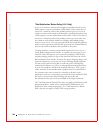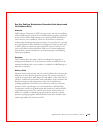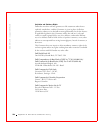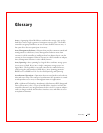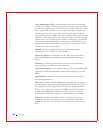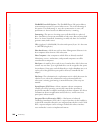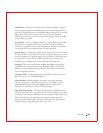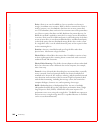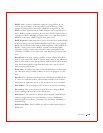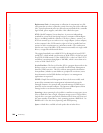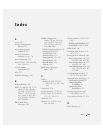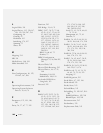
242 Glossary
www.dell.com | support.dell.com
Parity—Parity is an extra bit added to a byte or word to reveal errors in
storage (in random access memory, RAM, or disk) or transmission. Parity is
used to generate a set of redundancy data from two or more parent data
sets. The redundancy data can be used to reconstruct one of the parent data
sets. However, parity data does not fully duplicate the parent data sets. In
RAID, this method is applied to entire drives or stripes across all hard drives
in an array. Parity consists of dedicated parity, in which the parity of the data
on two or more drives is stored on an additional drive, and distributed parity,
in which the parity data are distributed among all the drives in the system.
If a single drive fails, it can be rebuilt from the parity of the respective data
on the remaining drives.
Partition—An array virtual disk made up of logical disks rather than
physical ones. Also known as logical volume.
Physical Drive—A hard drive that stores data. A hard drive consists of one
or more rigid magnetic discs rotating about a central axle with associated
read/write heads and electronics.
Physical Drive Roaming—The ability of some adapters to detect when hard
drives have been moved to a different slots in the computer, for example,
after a hot swap.
Protocol—A set of formal rules describing how to transmit data, especially
across a network. Low level protocols define the electrical and physical
standards to be observed, bit- and byte- ordering, and the transmission and
error detection and correction of the bit stream. High level protocols deal
with the data formatting, including the message syntax, the terminal-to-
computer dialogue, character sets, and sequencing of messages.
RAID—Redundant Array of Independent Disks. An array of multiple
independent hard disk drives that yields better performance than a Single
Large Expensive Disk (SLED). A RAID disk subsystem improves I/O
performance on a server using only a single drive. The RAID array appears to
the host server as a single storage unit. I/O is expedited because several disks
can be accessed simultaneously.



